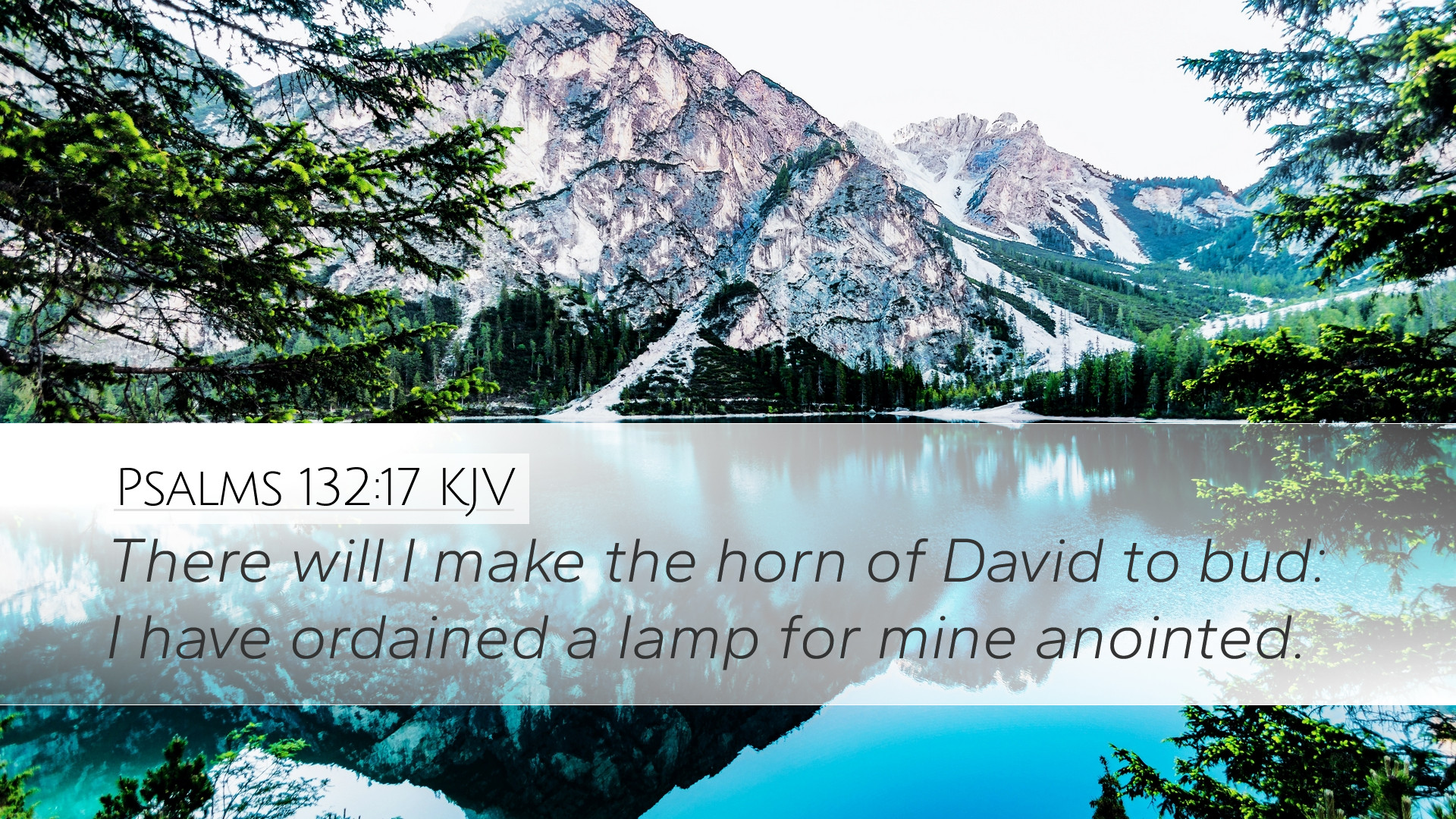Psalms 132:17 Commentary
Bible Verse: "There will I make the horn of David to bud: I have ordained a lamp for mine anointed." - Psalms 132:17
Introduction
The 132nd Psalm is a reflection on God's covenant with David and His promises to the descendants of David. This verse serves as a culmination of the themes of divine favor, leadership, and the everlasting covenant established with David and his lineage. Various public domain commentaries shed light on the richness of its meaning.
Historical Context
This Psalm is rooted in the history of Israel, particularly concerning the establishment of Jerusalem as the chosen city of God and the significance of David's kingship. The author's focus is on God's fidelity to His promises as well as the deep reverence for the holy city and its divine role.
Insights from Various Commentaries
Matthew Henry's Commentary
Matthew Henry emphasizes the cone of God’s support for David and his lineage. He remarks that the "horn" symbolizes strength and power. By saying that God "will make the horn of David to bud," it indicates both a continual renewal of Davidic rule and the assurance of divine empowerment for future generations.
Henry also highlights that the "lamp" signifies guidance and illumination, referring to the steadfast presence of God in David's lineage. This aspect underscores how God's anointment will shine brightly, inspiring leaders and followers alike.
Albert Barnes' Notes on the Bible
Albert Barnes interprets the "horn" metaphorically as it pertains to strength and vitality. He states that this verse affirms God's commitment to bless not just David himself but also his descendants. The annotation about the "lamp" for God’s anointed illustrates that God's chosen leaders will be graced with wisdom and moral clarity, ensuring that the light of righteous governance will never fade away.
Furthermore, Barnes draws attention to the future implications of this statement, believing that it reaches beyond David’s immediate rule, pointing towards the Messianic reign. This future hope serves as a precursor to the ultimate fulfillment in Christ, the Son of David.
Adam Clarke's Commentary
Adam Clarke offers a depth of insight regarding the use of "bud" in this context. He connects it to the idea of growth and revival, suggesting that God, through His providence, promises to invigorate and extend the Davidic line. Clarke also notes that the "lamp" represents life, direction, and preservation of both the people of Israel and its leaders.
Moreover, Clarke interprets the "horn of David" as the prosperous kingdom that should arise, closely linked with the covenant made by God. He reminds readers that David's victories in war and peace were only realized through divine intervention and that these themes echo throughout the history of Israel.
Theological Implications
The verse encapsulates significant theological themes pertinent to God's covenant, kingdom authority, and continuity of leadership. Through this promise, God reassures His people of the continuation of David's lineage, which plays a crucial role in the unfolding plan of salvation.
Covenant Faithfulness
The divine promise to make the "horn of David" to bud showcases the unbreakable nature of God's covenant with His people. This fidelity is a constant encouragement for believers, highlighting that God is always actively involved in the lives of His chosen ones, ensuring their growth and success.
Messianic Fulfillment
The broader Messianic interpretation connects this verse to the anticipation of Christ as the ultimate embodiment of David’s lineage. As the culmination of the "horn" and the "lamp," Christ brings fullness and perfection to the Davidic promise. The implications of this passage invite a deeper understanding of God’s redemptive plan throughout scripture.
Conclusion
Psalms 132:17 serves as a powerful reminder of God's unwavering commitment to His chosen ones and the promise of future blessings that extend into eternity. The commentaries of Henry, Barnes, and Clarke enrich our understanding, urging pastors, students, theologians, and scholars to reflect upon God’s active role as well as His promises that illuminate the paths of leaders and the faithful alike.


